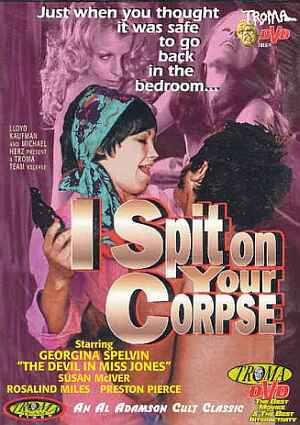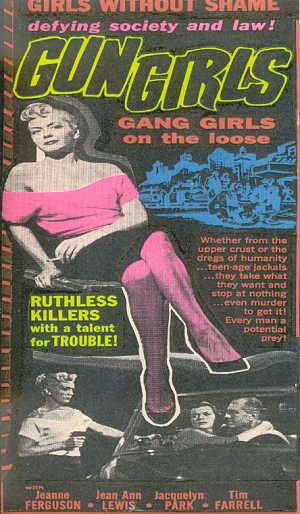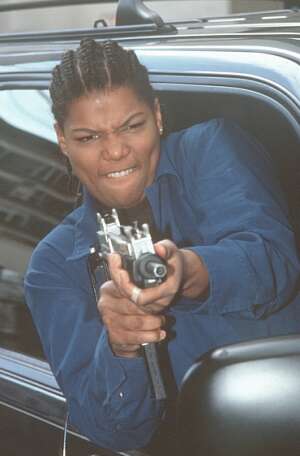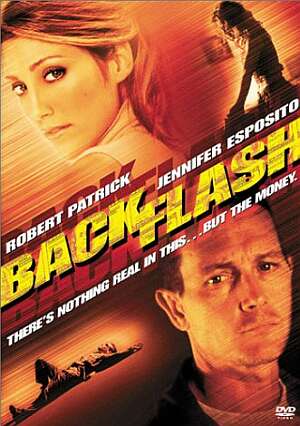★★★★
“Nothing like Kill Bill at all – no, really! :-)”

 It’s surprising no-one has mentioned the similarity this 1991 pic has to Kill Bill, especially given QT’s liking, both for lifting plots and Hong Kong movies. Here, Cynthia Khan plays Kwanny, the daughter in a gangster family whose wedding day is interrupted by the treacherous slaughter of her intended (and a good few others). Thus explodes a spiral of revenge and betrayal, in which she gets plenty of chance to use her martial arts and gun skills. Of course, there are differences – she is unaware of her enemy within – but the overlap is striking. No doubt Tarantino will claim not to have heard of it – any more than he’d seen City on Fire, before making Reservoir Dogs…
It’s surprising no-one has mentioned the similarity this 1991 pic has to Kill Bill, especially given QT’s liking, both for lifting plots and Hong Kong movies. Here, Cynthia Khan plays Kwanny, the daughter in a gangster family whose wedding day is interrupted by the treacherous slaughter of her intended (and a good few others). Thus explodes a spiral of revenge and betrayal, in which she gets plenty of chance to use her martial arts and gun skills. Of course, there are differences – she is unaware of her enemy within – but the overlap is striking. No doubt Tarantino will claim not to have heard of it – any more than he’d seen City on Fire, before making Reservoir Dogs…
On its own merits, Queen’s High stands up nicely, after a sluggish start. You might be wondering how to keep track of a parade of characters, but don’t worry, they won’t last long. The wedding-day slaughter on its own gets it our seal of approval, a masterpiece of slo-mo squibbing that’s in my personal top ten of action heroine sequences, and brings a new meaning to “until death do us part”. It also lets Cynthia Khan, who has her share of acting talent, transform from happy daughter to avenging angel, as during In the Line of Duty 3. The action side finally bursts into life in the final reel, Kwanny taking on a whole warehouse of bad guys, and discovering who ordered the massacre. The film certainly has weaknesses, but such strengths easily make up for them.
Dir: Chris Lee Kin Sang
Star: Cynthia Khan, Simon Yam, Newton Lai, Shum Wai





 Not the Billy Bob Thornton/Bruce Willis vehicle of the same name, this German film is several years older. Four girls, in the titular prison band, seize the chance to escape when playing at a police function. With freedom comes unexpected fame, thanks to a tape sent to an unscrupulous record company executive. There is plenty of potential for a Natural Born Killers-style hack at the media, manafactured celebrity: the Bandits could go after the exec for exploiting them, he could encourage the cops to shoot the fugitives and increase sales, etc. Von Garnier largely avoids this, in favour of unsuccessful chick-flick emoting, and a slightly surreal approach, like a long-format pop video. Add an irrelevant subplot in which the Bandits take a hostage, play with him for a bit, then dump him, and it’s clear the script is embarrassingly weak.
Not the Billy Bob Thornton/Bruce Willis vehicle of the same name, this German film is several years older. Four girls, in the titular prison band, seize the chance to escape when playing at a police function. With freedom comes unexpected fame, thanks to a tape sent to an unscrupulous record company executive. There is plenty of potential for a Natural Born Killers-style hack at the media, manafactured celebrity: the Bandits could go after the exec for exploiting them, he could encourage the cops to shoot the fugitives and increase sales, etc. Von Garnier largely avoids this, in favour of unsuccessful chick-flick emoting, and a slightly surreal approach, like a long-format pop video. Add an irrelevant subplot in which the Bandits take a hostage, play with him for a bit, then dump him, and it’s clear the script is embarrassingly weak. Porn stars who try to act are usually on shaky ground – see Traci Lords’ career – except, it seems, when the characters they play have something of the porn star in them. Brigitte Lahaie in Fascination is a good example, and Spelvin, best known for The Devil in Miss Jones, impresses here as Tate, a cold, animalistic killer, freed from prison by mob boss Moreno (Taylor) to kill a treacherous lawyer. Which goes fine, it’s when her unwitting accomplice Donna (McIver) realises what happened, and goes on the run, that the film really starts. The chase is on: can Tate and sidekick Erica (Miles) hunt Donna down before she reaches Mexico?
Porn stars who try to act are usually on shaky ground – see Traci Lords’ career – except, it seems, when the characters they play have something of the porn star in them. Brigitte Lahaie in Fascination is a good example, and Spelvin, best known for The Devil in Miss Jones, impresses here as Tate, a cold, animalistic killer, freed from prison by mob boss Moreno (Taylor) to kill a treacherous lawyer. Which goes fine, it’s when her unwitting accomplice Donna (McIver) realises what happened, and goes on the run, that the film really starts. The chase is on: can Tate and sidekick Erica (Miles) hunt Donna down before she reaches Mexico? Originally, Satanik was the villain in a series of Italian photonovels/comics. But in 1964, writer Max Bunker changed the sex and this 1968 movie – set in Spain, made by Italians – followed, though Satanik isn’t mentioned by name (I guess, a little like Heavy Metal). The central character here is a disfigured scientist, temporarily turned beautiful by a potion which also removes all her morals and inhibitions. The body count mounts, and to escape the cops, she takes another woman’s identity; unfortunately, her victim was a police stoolpigeon, and those she grassed up are also very keen to find her. Plus, her medication is wearing off…
Originally, Satanik was the villain in a series of Italian photonovels/comics. But in 1964, writer Max Bunker changed the sex and this 1968 movie – set in Spain, made by Italians – followed, though Satanik isn’t mentioned by name (I guess, a little like Heavy Metal). The central character here is a disfigured scientist, temporarily turned beautiful by a potion which also removes all her morals and inhibitions. The body count mounts, and to escape the cops, she takes another woman’s identity; unfortunately, her victim was a police stoolpigeon, and those she grassed up are also very keen to find her. Plus, her medication is wearing off…
 Another slightly clunky Korean title (see also Guns & Talks), but the first forty minutes or so of this are about the driest comedy/action you could ever hope to see. In order to fulfill the wish of her terminally-ill sister, mob boss Eu-jin (Shin), or “Mantis” as she is known, decides she to get married. Of course, she needs an especially stupid husband who won’t realise her true occupation, and finds one in Soo-il (Park), a civil servant with a 0% success rate on his blind dates. Their courtship, pre-nuptials and wedding (the last interrupted by a rival gang – a “martial arts demonstration”, as a fast-thinking sidekick calls it) are executed perfectly, largely thanks to Shin and her expressions of shock and horror at the mating game.
Another slightly clunky Korean title (see also Guns & Talks), but the first forty minutes or so of this are about the driest comedy/action you could ever hope to see. In order to fulfill the wish of her terminally-ill sister, mob boss Eu-jin (Shin), or “Mantis” as she is known, decides she to get married. Of course, she needs an especially stupid husband who won’t realise her true occupation, and finds one in Soo-il (Park), a civil servant with a 0% success rate on his blind dates. Their courtship, pre-nuptials and wedding (the last interrupted by a rival gang – a “martial arts demonstration”, as a fast-thinking sidekick calls it) are executed perfectly, largely thanks to Shin and her expressions of shock and horror at the mating game. “It was a nightmare to shoot: the producer and director were constantly fighting… It was completely unorganised. Alexis [Denisof] was also in it and he and I would go into each other’s trailers and go, “We’ve made a huge mistake, this is the worst thing ever!” It just went terribly, terribly wrong.” So says Hannigan: wouldn’t say it was
“It was a nightmare to shoot: the producer and director were constantly fighting… It was completely unorganised. Alexis [Denisof] was also in it and he and I would go into each other’s trailers and go, “We’ve made a huge mistake, this is the worst thing ever!” It just went terribly, terribly wrong.” So says Hannigan: wouldn’t say it was  Based on the director’s novel, Girls on Parole, this prime slice of Juvenile Delinquent nonsense remains endlessly fascinating for students of “bad” movies, not least for its schizophrenic approach. It manages to combine moralistic doctrine – most notably from a parole officer who speaks Entirely In Headlines – and exploitation, with the heroines stripping down to their foundation garments (hey, this was 1956, whaddya expect?) about every ten minutes.
Based on the director’s novel, Girls on Parole, this prime slice of Juvenile Delinquent nonsense remains endlessly fascinating for students of “bad” movies, not least for its schizophrenic approach. It manages to combine moralistic doctrine – most notably from a parole officer who speaks Entirely In Headlines – and exploitation, with the heroines stripping down to their foundation garments (hey, this was 1956, whaddya expect?) about every ten minutes. After a couple of less-than-perfect entries in the ‘robbery girls’ subgenre, this came as a refreshing blast, with decent characterisation and a storyline that goes past the painfully obvious. Mind you, the moral remains the same – crime doesn’t pay – but at least the road taken to get there is interesting and complex. These women all have their own reasons for wanting to rob banks: getting back at society for perceived injustice, supporting a child, or simply for kicks. Interestingly, you can see both their point of view and society’s, the latter most clearly in a surprisingly sympathetic cop, Strode (John C. McGinley). The results are more a product of tragic circumstance than anything else.
After a couple of less-than-perfect entries in the ‘robbery girls’ subgenre, this came as a refreshing blast, with decent characterisation and a storyline that goes past the painfully obvious. Mind you, the moral remains the same – crime doesn’t pay – but at least the road taken to get there is interesting and complex. These women all have their own reasons for wanting to rob banks: getting back at society for perceived injustice, supporting a child, or simply for kicks. Interestingly, you can see both their point of view and society’s, the latter most clearly in a surprisingly sympathetic cop, Strode (John C. McGinley). The results are more a product of tragic circumstance than anything else. Harley (Esposito) comes out of prison, and links up with timorous video store owner Ray (Patrick), who must impersonate her boyfriend in order to collect $2m stashed in a safe-deposit box. The cash was swindled from mob money-shuffler Gin (Meaney) – understandably he’s keen to get it back before his boss notices. You will not be surprised to hear that hardly anyone in this film is quite what they seem.
Harley (Esposito) comes out of prison, and links up with timorous video store owner Ray (Patrick), who must impersonate her boyfriend in order to collect $2m stashed in a safe-deposit box. The cash was swindled from mob money-shuffler Gin (Meaney) – understandably he’s keen to get it back before his boss notices. You will not be surprised to hear that hardly anyone in this film is quite what they seem.